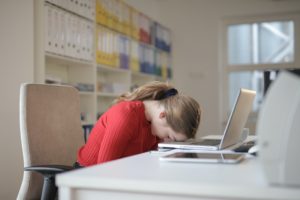By Chandler McCoy
Teenagers and young adults in America cannot get enough sleep, and most say they are well aware of too many hours awake.
Sleep deprivation has become a chronic issue among young people, even being referred to as a public health epidemic by the American Academy of Pediatrics. While experts say teenagers need around eight to 10 hours of sleep per night, data from the National Sleep Foundation retrieved between 2007-2013 said that almost 70% of high school students got seven hours of sleep or less.
The sustained loss of sleep comes with its own set of negative consequences. The most apparent symptoms include daytime drowsiness and mood changes, but sleep deprivation can also make teenagers more likely to experience memory and concentration problems, anxiety, depression, shortened attention span and lowered academic or athletic performance. 
Ava Gonzalez and William Crawford are no strangers to the unhealthy pattern of not getting enough sleep. The 16-year-old high school students both said that although they know the amount of sleep they should be getting, they tend to fall two to three hours short on an average night. As a result, they said they often experience the negative effects of sleep deprivation, especially drowsiness and memory issues in school.
“You get used to a pattern of going to sleep late,” Crawford said.
And the problem is not unique to high school students. According to the CDC, adults aged eighteen and older need at least seven hours of sleep to remain within the healthy range. However, 46% of adults between the ages of 18 and 29 sleep for six hours or less, according to a 2013 Gallup poll.
Lauren Richerdson, a 26-year-old employee at Friendship Hospital for Animals in Washington D.C. said she sleeps only 4 to 6 hours on an average night. She works overnight shifts; usually going from 10 p.m. to 8 a.m. and losing valuable nights of sleep.
Richerdson knows that her tendency to lose sleep causes her to experience symptoms like drowsiness and anger, which she usually relieves by using caffeine products. She is also aware of the potential for sleep deprivation to affect her hygiene, her mental well-being, and even others in incidents like traffic accidents caused by drowsiness or fatigue.
The reasons for the loss of sleep vary between teenagers and young adults. Teenagers tend to refer to school as the main obstacle to getting adequate sleep. Fourteen-year-old student Ethan Fox-Fernandez says that the cause is “partly procrastination, other times it’s just a lot of work that [he has] to do.” Schoolwork causes Fox-Fernandez to lose two to three hours of sleep that he achieves much more easily in the summer without it.
In addition to academic responsibilities, Crawford said technology is a major hurdle. Crawford said that device use, especially at night, prevents him from getting as much sleep as he could.
Young adults, however, have the additional pressure of balancing full-time jobs along with the maintenance of their own social and personal lives.
“Money,” Richerdson said simply, is the main reason why young adults like her do not get enough sleep. Having to work constantly to maintain a stable living forces these people to leave hours of sleep behind.
Richerdson said finding the balance between upholding the grind of daily life and taking moments to unwind is also a unique challenge. She said that while there are moments where work must get done and “sleep has to suffer,” there are also moments where it is important to admit “at this point in time, I’m too tired.”
These teenagers said that they do have some ideas on how to get the amount sleep that they need.
Crawford said that in addition to bettering time management and reducing device use, educating teenagers about their sleep and how to form better sleep habits would help them to be more well-rested.
Fox-Fernandez also offered an interesting solution. While the average start time for public high schools in the United States is 8:00 a.m. according to the National Center for Education Statistics, Fox-Fernandez said that his classes begin an hour later at 9:00. Therefore, he believes that pushing back school start times could give students more time to catch up on sleep.
Whether the solution is to learn healthier sleep habits or adjust work and school schedules to support sufficient sleep, the key to helping teenagers and young adults avoid sleep deprivation lies in more than letting them know they are not sleeping enough.
